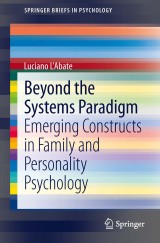Details

Beyond the Systems Paradigm
Emerging Constructs in Family and Personality PsychologySpringerBriefs in Psychology
|
53,49 € |
|
| Verlag: | Springer |
| Format: | |
| Veröffentl.: | 30.05.2013 |
| ISBN/EAN: | 9781461474449 |
| Sprache: | englisch |
| Anzahl Seiten: | 101 |
Dieses eBook enthält ein Wasserzeichen.
Beschreibungen
This monograph owes its origins to the decades-old proposal by David Bakan (1968) about the duality of human experience. He proposed that community and agency would be two necessary and sufficient constructs to classify and to encompass most human relationships. This dichotomy has been found to be valid by a variety of contributions
over the last half a century (L’Abate, 2009; L’Abate, Cusinato, Maino,
Colesso, & Scilletta, 2010).
Additionally, the purpose of this book is to argue and assert that two important fields of psychology, family and personality psychologies, if not already dead are conceptually, empirically, and practically
moribund. They are being superseded respectively by perhaps more appropriate, perhaps more specific, and more likely verifiable concepts and constructs, such as intimacy and identity. The traditional family still
conceived as composed by two parents and two children of different gender is esponsible for only one fourth of all domiciles in USA. Singles, same-sex couples, and completely different family organization complete the remaining 100%. Difficulties in defining what is personality require a change in perspective and advance toward a comprehensive theory of human relationships that can and should fulfill requirements necessary to achieve an undoubtedly grandiose and ambitious universal status.
over the last half a century (L’Abate, 2009; L’Abate, Cusinato, Maino,
Colesso, & Scilletta, 2010).
Additionally, the purpose of this book is to argue and assert that two important fields of psychology, family and personality psychologies, if not already dead are conceptually, empirically, and practically
moribund. They are being superseded respectively by perhaps more appropriate, perhaps more specific, and more likely verifiable concepts and constructs, such as intimacy and identity. The traditional family still
conceived as composed by two parents and two children of different gender is esponsible for only one fourth of all domiciles in USA. Singles, same-sex couples, and completely different family organization complete the remaining 100%. Difficulties in defining what is personality require a change in perspective and advance toward a comprehensive theory of human relationships that can and should fulfill requirements necessary to achieve an undoubtedly grandiose and ambitious universal status.
The Meaning of Constructs.- The Decline and possible Demise of Family Psychology: Families without Personalities.- The Decline and possible Demise of Personality Psychology: Personalities without Families.- The (Slow but Sure) Rise of Attachment Theory, Communication and Relationship Science.- Relational Competence Theory: Toward a Comprehensive Classification of Human Relationship.- Conclusion: Identity as an Overarching Construct in Relational Competence Theory.
Since his retirement in 1990, Luciano L’Abate, Ph.D. has been Professor Emeritus at Georgia State University where he was previously a Professor of Psychology beginning in 1965. L’Abate has been an editorial board member of many national and foreign professional and scientific journals, as well as a consultant to various publishing houses. He is the author and co-author of over 300 papers, chapters, and book reviews in professional journals in addition to authoring/editing 34 books. His work has been translated into Chinese, Japanese, Finnish, Spanish, French, Polish, and German languages. Dr. L’Abate is the recipient of many awards including "Family Psychologist of the Year for 1994" by Division 43 of the American Psychological Association, "Outstanding Contribution" by the Georgia Association for Marriage and Family Therapy, and "Outstanding Citizen" by the House of Representatives in the State of Georgia. He has also held workshops and lectured extensively in the United States, Australia, Canada, New Zealand, Japan, Germany, Spain, and Italy. Dr. L’Abate has spent the last several years involved full-time in writing and research since his retirement from Georgia State University.
<p>Mother, father, children together in a household. The number of U.S. families fitting that profile is declining steadily. And yet this arrangement is still the basis of so much of family systems theory and therapy--while the disconnect between theory and therapy is widening. </p><p>In response, <i>Beyond the Systems Paradigm</i> argues for the critical place of the individual in family psychology, and for the ties between family and personality psychologies as a key to modernizing systems theory and practice. The latest offering from Luciano L'Abate builds on his earlier work by analyzing the intricate relationships between conceptual ideas and clinical reality, and how this knowledge can translate into more robust theory, useful research, and effective assessment and therapy with families. The author adds new constructs of identity and intimacy to refine his Relational Competence Theory, and his new models update--and find common ground between--traditional family and personality constructs. A perspective-building tool for organizing how one understands theory and does therapy, this timely volume: </p><ul><li>Clarifies the links between paradigms, theories, constructs, models, and dimensions.</li><li>Details the shortcomings of family and personality psychologies in not informing one another.</li><li>Critically reviews the evolution of family systems and personality theory.</li><li>Analyzes the central role of constructs in theory building and clinical process.</li><li>Contributes new ideas to the classification of human relationships.</li><li>Situates identity as an overarching construct in Relational Competence Theory.</li></ul><p>For family therapists and clinicians as well as personality theorists, <i>Beyond the Systems Paradigm</i> provides the structure to make theory relevant, and the flexibility to make it practical.</p>
Origins of this volume are derived from David Bakan's old proposal about the duality of human experience

















